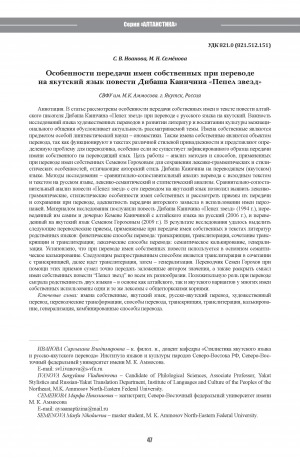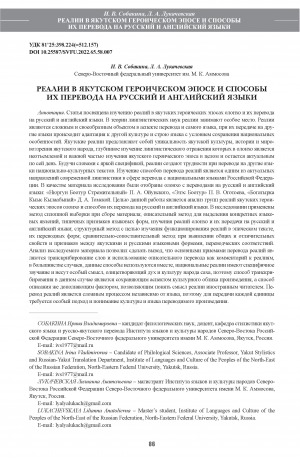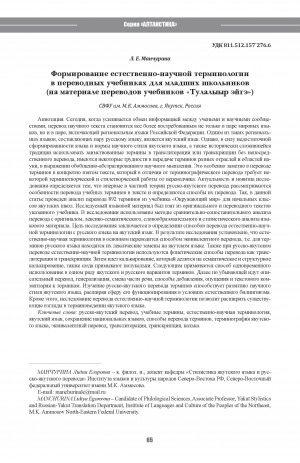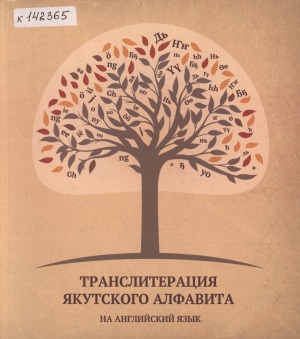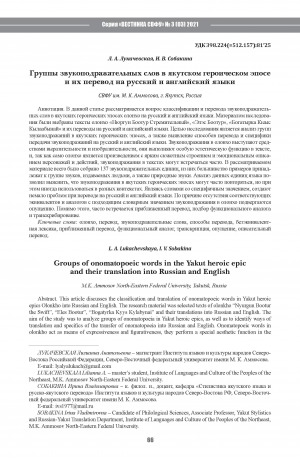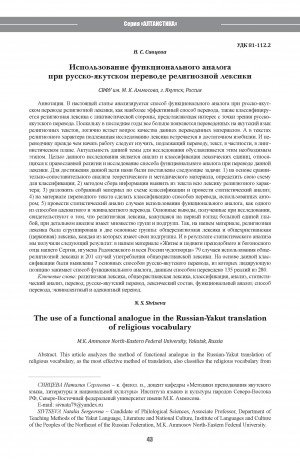
Принципы и правила передачи на русский язык специфических звуков якутского языка = Principles and rules for translating specific sounds of the Yakut language into Russian
Статья в журнале
Русский
811.512.157'255.2=161.1
10.25587/2782-6627-2024-4-73-84
транскрипция; транслитерация; алфавит; графика; топонимика; безэквивалентная лексика; перевод; русский язык; якутский язык; государственный язык; лингвистический ландшафт; transcription; transliteration; alphabet; graphic; toponymy; culture-specific vocabulary; translation; Russian language; Yakut language; state language; linguistic landscape
Based on the analysis of a large volume of translations of texts of different styles and genres, this article formulates the principles and guidelines for establishing rules for transcription and transliteration in Russian of specific sounds and letters of the Yakut language. The relevance of the study lies in the fact that the current rules for the transcription of geographic names were approved half a century ago in the “Instructions for the Russian translation of geographical names of the Yakut ASSR”. With the exception of cartography and reference books of the administrative and territorial structure of the republic, they are not observed anywhere. In this regard, there is a need to revise these rules, taking into account the vast translation experience and achievements of Yakut linguistics, to approve new rules, and to develop mechanisms for state and public control over their observance. The article defines the difference between transcription and transliteration in the case of common alphabets of the contacting languages; formulates the principles of transmitting specific sounds of the Yakut language via transcription and transliteration by means of the Russian language; and develops guidelines in accordance with the formulated principles. In the first part, the article provides a brief overview of the current legal acts governing the spelling of Yakut geographical and personal names. It also briefly analyses the linguistic foundations of the current rules set out in the Instructions. In addition, the article describes the results of the analysis on transcribing Yakut non-equivalent vocabulary in different years by different teams of translators. These are the translations of 12 olonkho, the historical novel “Remote Vilyui” by Vasily Dalan, as well as the material collected in the reference books of borrowed words by Professor Nikolay Samsonov. While writing this article, the author relied on the provisions of the general theory of translation developed by professor Dmitry Ermolovich and set out in his monograph, and also refers to the results of research by Yakut phoneticians Dyachkovsky and Alekseev, methodologists Samsonova and Dmitrieva. The principles established in this article and the recommendations developed on their basis for the translation of specific sounds of the Yakut language into Russian, in the author’s opinion, will contribute to the preservation of the historical memory of the Sakha people because they translate with the most care the graphic appearance of the original word in the context of the common alphabets of the contacting languages.
Васильева, А. А.
Принципы и правила передачи на русский язык специфических звуков якутского языка / А. А. Васильева ; Северо-Восточный федеральный университет имени М. К. Аммосова // Вестник Северо-Восточного федерального университета им. М. К. Аммосова. Серия "Алтаистика". - 2024. - N 4 (15). - С. 73-84. - DOI: 10.25587/2782-6627-2024-4-73-84
DOI: 10.25587/2782-6627-2024-4-73-84
- Языкознание. Филология. Художественная литература > Языкознание и языки. Лингвистика > Якутский (саха),
- Языкознание. Филология. Художественная литература > Языкознание и языки. Лингвистика > Русский язык,
- НАУКА ЯКУТИИ > ЯЗЫКОЗНАНИЕ. ФИЛОЛОГИЯ. ЛИТЕРАТУРОВЕДЕНИЕ. ХУДОЖЕСТВЕННАЯ ЛИТЕРАТУРА > Языкознание и языки. Лингвистика.
Войдите в систему, чтобы открыть документ
